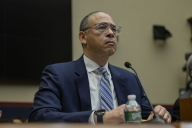You have /5 articles left.
Sign up for a free account or log in.
The Professional Staff Congress -- which represents faculty members at the City University of New York -- is one of the largest faculty unions in the country, representing more than 25,000 people. The union, an affiliate of the American Federation of Teachers and the American Association of University Professors, has long been outspoken in discussions about the mistreatment of faculty members off the tenure track. And the union has been a leading critic of Pathways, a CUNY initiative that is designed to ease the transfer of students at the system's community colleges to its four-year institutions, a goal that many professors applaud even as they say CUNY has ignored faculty critiques of the way the system designed the program.
The PSC is currently trying to get its members to rally against the Pathways program, in part by holding a vote of no confidence in the program. (A summary of the union's objects to Pathways may be found here.) Last week, the union leaders in its Delegate Assembly voted that only full-time faculty members (largely the tenured and tenure-track) should be able to decide the measure. The part-timers who teach many CUNY courses, especially at community colleges, requested the right to vote on the measure, but were told that they could not do so.
An account of the union leadership's vote, written by an adjunct activist at CUNY, has been circulating online this weekend. The account describes adjuncts leaving the room furious after the decision to exclude them from the vote, calling the outcome "surreal" "grotesque" and "a disgrace."
Sándor John, who is an adjunct at CUNY's Hunter College, wrote in the account that the vote was "a stinging slap in the face to CUNY's contingent majority," adding that "the decision is divisive, hurtful, contrary to elementary democracy, deeply damaging to union solidarity, and a big present to management-minded enemies of unionism." John also wrote that the vote illustrated the problems of a "two-tier" union such as the PSC in which a single faculty union is charged with representing the interests of both those on and off the tenure track. John is one of the organizers of CUNY Contingents Unite, a group that has advocated for better pay and working conditions for adjuncts.
Barbara Bowen, president of the PSC, said that the account of the vote was "very irresponsible," and neglected to mention key facts. She said that CUNY's faculty governance system gives the full-time faculty a specific role in curricular matters, and that role "has been over-ridden" by the university's administrators in their decisions on Pathways. As a result, she said, it was important to have that group of faculty members take a stand. Further, Bowen said it was unfair to characterize the decision has suggesting anything about the union's commitment to adjuncts. Rather, she said this was a "tactical decision" -- and that some adjuncts backed this view.
She noted that, at the same meeting where the Delegate Assembly voted to restrict the no confidence to full-timers, she announced an agreement on adjunct health insurance that she said reflected the PSC's commitment to those off the tenure track.
The union decision to exclude CUNY's adjuncts from voting on the no confidence measure comes at a time of increased attention to the issue of whether higher education (administrations and faculties alike) gives an appropriate voice to those who at many institutions do a majority of the teaching. In January, the AAUP issued a report calling for adjuncts to be given full voting rights on most issues related to governance and the curriculum. In November, the Delphi Project at the University of Southern California -- backed by labor and management groups in higher education and aiming to improve the treatment of adjuncts -- urged colleges to consider a number of questions. One of them was whether faculty unions spoke only for full-time faculty members, or also for part-timers. Calls for adjuncts to have full voting rights have stressed that on curricular matters, it is particularly important that elections reflect the perspectives of the group that, on many campuses, teaches most of the sections.
Some adjuncts say that unions have been too slow to give true decision-making authority to those off the tenure track, even as their numbers have grown. It was only in 2011 -- after repeated failed attempts -- that the Massachusetts Community College Council (a faculty union affiliated with the National Education Association) gave part-timers full voting rights, instead of one-fourth of a vote. (Part-timers by far outnumber full-timers in the union.)
Marcia Newfield, vice president of the PSC for part-time personnel, said that she voted to allow part-timers to participate in the referendum. "I felt excluded," she said of the outcome. Further, she said that John's account of the anger of part-timers was accurate, and that many adjuncts were indeed deeply hurt by the decision that they couldn't vote.
But Newfield added that there was "a strategy" behind the decision, and that she understood that strategy even if she did not fully agree with it. Newfield said that the PSC believes that the CUNY administration should defer on Pathways to the various faculty committees that have curricular responsibility. Those are the bodies that "have been ignored," Newfield said. Since those bodies are made up of tenure-track and tenured professors, she said, the union leadership believes those are the people who should vote on the referendum.
"The leadership felt that the vote wouldn't have the clout" if it included non-tenure-track faculty members, she said. "I think the PSC is embracing the reality of where things are," she said.
Newfield said that she hoped the issue would be a "wake-up call" so that adjuncts would be added to all faculty committees. She also said that she hoped that PSC would sponsor a "parallel vote" on Pathways so that adjuncts could express their views on it.
She added that she did not know of any particular differences of opinion between full-timers and part-timer on Pathways.








